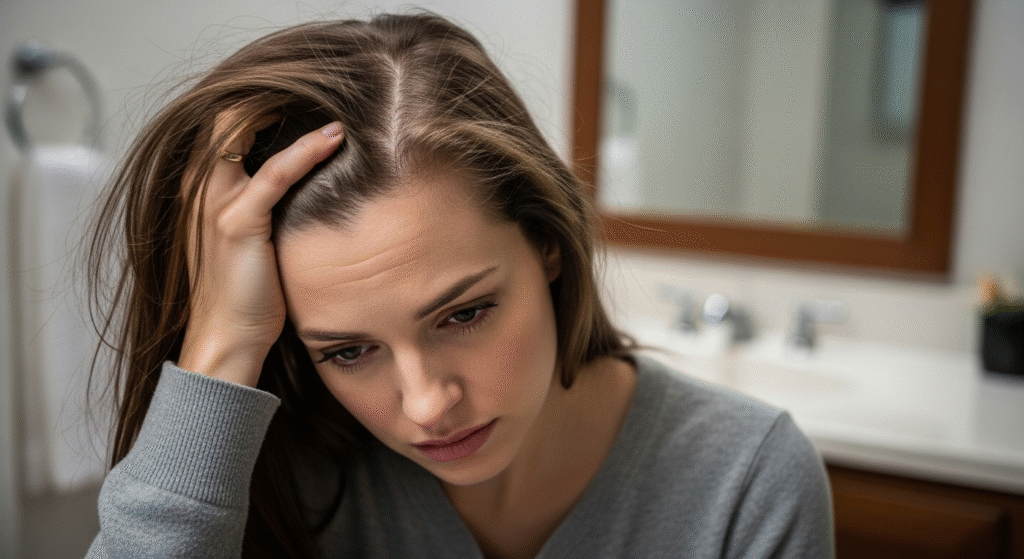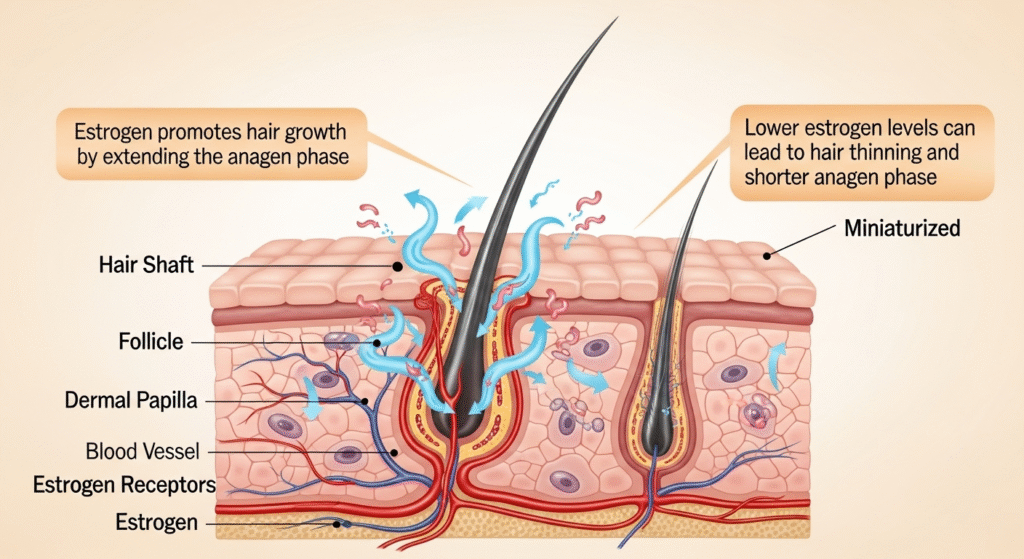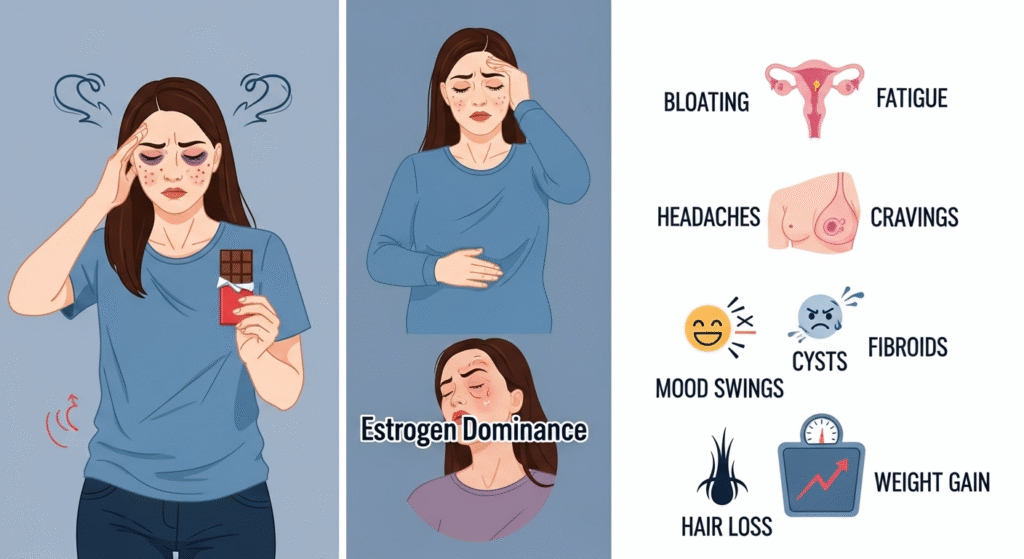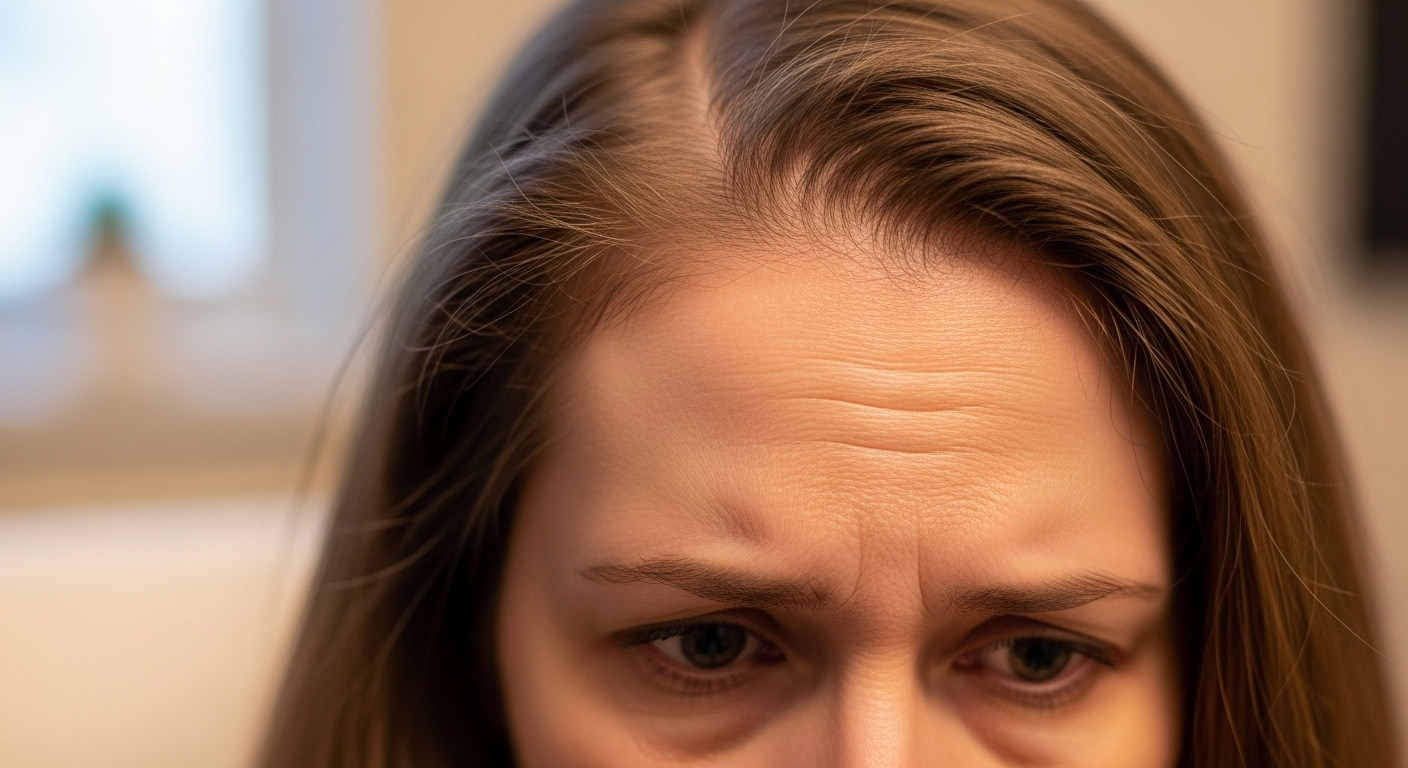Hair loss can be emotionally distressing—especially when the cause is hidden within your hormonal balance. Estrogen dominance hair loss is a common yet often misunderstood condition, particularly in women, where imbalanced estrogen levels trigger unexpected thinning or shedding. This article explains what estrogen dominance is, how it impacts hair growth, and most importantly, how to …
Hair loss can be emotionally distressing—especially when the cause is hidden within your hormonal balance. Estrogen dominance hair loss is a common yet often misunderstood condition, particularly in women, where imbalanced estrogen levels trigger unexpected thinning or shedding.
This article explains what estrogen dominance is, how it impacts hair growth, and most importantly, how to manage and treat it effectively.

What Is Estrogen Dominance?
Estrogen dominance occurs when the levels of estrogen in the body become disproportionately high compared to progesterone. This hormonal imbalance doesn’t necessarily mean estrogen levels are too high overall; it could also mean progesterone is too low in relation.
Common causes include:
- Perimenopause or menopause
- Chronic stress
- Hormonal contraceptives
- Environmental estrogens (xenoestrogens)
- Obesity or poor liver detoxification
When estrogen is not balanced properly, it can disrupt various functions, including the hair growth cycle.
How Estrogen Affects Hair Growth

Estrogen plays a key role in supporting the anagen (growth) phase of hair. During pregnancy, for instance, women often experience thicker hair due to elevated estrogen levels. However, when estrogen becomes dominant in an imbalanced way, the hair cycle is disrupted.
Here’s how it affects your scalp:
- Prolonged resting phase: Hair may prematurely enter the telogen (resting) phase.
- Hair thinning: Follicles shrink, resulting in thinner strands.
- Diffuse hair loss: Unlike patchy alopecia, estrogen dominance usually causes overall thinning, especially along the crown.
Signs and Symptoms of Estrogen Dominance

In addition to hair loss, you may notice these related symptoms:
- Fatigue and mood swings
- Irregular periods or PMS
- Weight gain, especially around hips/thighs
- Breast tenderness
- Poor sleep or anxiety
- Bloating and water retention
Recognizing these symptoms can help you understand if hair loss is part of a larger hormonal imbalance.
Who Is Most at Risk?
While estrogen dominance can affect anyone, certain groups are more vulnerable:
- Perimenopausal and menopausal women
- Women using hormone replacement therapy (HRT)
- Individuals with thyroid disorders
- Women with PCOS or endometriosis
- Those with chronic stress or adrenal fatigue
Understanding your risk profile can help you take preventive action early.
Diagnosis: How to Confirm Estrogen Dominance
To properly treat estrogen dominance-related hair loss, a diagnosis is essential. Your doctor may recommend:
- Saliva or blood hormone tests (to measure estrogen, progesterone, cortisol, thyroid)
- Hair mineral analysis
- Thyroid function tests
- Liver function panels
Early detection improves outcomes, especially when paired with lifestyle changes and targeted therapies.
Can Estrogen Dominance Be Reversed?
Yes, in many cases, estrogen dominance is reversible with proper treatment. The key is restoring hormonal balance and addressing underlying issues such as liver health, gut dysfunction, or stress.
Treatment Options for Estrogen Dominance Hair Loss

Here are the most effective treatment strategies, both natural and medical:
1. Dietary Changes
A hormone-balancing diet is foundational:
- Increase cruciferous vegetables (broccoli, kale) for estrogen detox
- Add flaxseeds for hormone regulation
- Avoid refined carbs and sugars
- Include liver-supportive foods like beets and leafy greens
2. Lifestyle Adjustments
- Reduce exposure to xenoestrogens (found in plastics, cosmetics)
- Improve sleep hygiene
- Manage stress via yoga, meditation, or walking
- Avoid overexercising, which may disrupt hormones
3. Supplements
Consider these supplements (consult your doctor first):
- DIM (Diindolylmethane) – Supports estrogen metabolism
- Calcium D-Glucarate – Aids in estrogen elimination
- Vitex (Chasteberry) – Promotes progesterone production
- Magnesium & B Vitamins – Support adrenal health
4. Medical Interventions
For more severe or persistent cases:
- Bioidentical Hormone Replacement Therapy (BHRT)
- Progesterone creams
- Thyroid support medications (if needed)
- Hair regrowth treatments like Minoxidil (topical)
How Long Does It Take to See Results?
Patience is key. Most people begin to see noticeable hair improvement within 3–6 months after starting treatment, though this varies based on the severity of the imbalance and overall health.
You can accelerate recovery by combining nutritional, lifestyle, and medical approaches.
Tips to Prevent Hormonal Hair Loss
- Avoid synthetic hormone use unless medically necessary
- Detox regularly with fiber, water, and liver-loving foods
- Support gut health with probiotics
- Stay physically active but not excessively
- Use natural personal care products free from parabens and sulfates
FAQs
1. Can men experience estrogen dominance hair loss?
Yes. Though rare, men with low testosterone and high estrogen (due to obesity, aging, or medications) may experience thinning hair.
2. Will my hair grow back once hormones are balanced?
In most cases, yes—especially if the follicles haven’t been permanently damaged.
3. Is estrogen dominance the same as high estrogen?
Not necessarily. It’s about the ratio of estrogen to progesterone, not just absolute levels.
4. Can birth control cause estrogen dominance?
Yes. Many hormonal contraceptives increase estrogen and suppress natural progesterone production.
5. Are there any topical solutions for estrogen-related hair loss?
Topical minoxidil and hormone creams may help but should be used under medical supervision.
Take Your Next Step
If you’re struggling with unexpected hair loss and suspect hormones are to blame, don’t wait. Book a consultation with Consult with Dr. Uzma Irfan, an ISHRS-certified surgeon in Islamabad today to receive a personalized hormone panel and a safe, effective hair restoration plan.






